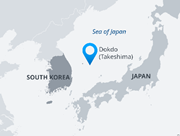

8th May 2023 (6 Topics)
Context
Japan and South Korea agreed to take forward ties and move past lingering historical disputes, pledging to transform a relationship that could have broad implications for the region.
Key-highlights
- Japanese Prime Minister Fumio Kishida became the first Japanese leader to visit Seoul in 12 years.
- The visit followed a trip to Japan in March by South Korean President Yoon Suk Yeol.
What are the common concern?
- Both countries are brought together by shared concerns over
- North Korea’s nuclear programme
- China’s regional muscle-flexing
What are the disputes between South Korea and Japan?
Relations between the two North Asian U.S. allies have been strained over disputes dating to Japan's 1910-1945 occupation of Korea.
- Japan's colonial-era atrocities: The two Asian nations have long had lukewarm relations because of Japan's colonial occupation of the peninsula for 35 years until 1945. Japan's colonial-era atrocities towards Korea, such as sexual slavery and forced labor.
- Abuse of women workforce: Koreans accuse Japan of forcing women to work in wartime brothels for the Japanese military and using forced labour, among other abuses.
- Trade restrictions: Relations deteriorated in 2019 when Japan restricted exports of high-tech material to South Korea.
- Territorial dispute: The two countries also have a territorial dispute over a cluster of windswept volcanic islets, known as Dokdo in Korea and Takeshima in Japan.
- The islets are controlled by Seoul, with a small contingent of coast guard personnel, but are also claimed by Tokyo.

- The islets are controlled by Seoul, with a small contingent of coast guard personnel, but are also claimed by Tokyo.
How would it impact India?
- India, which has friendly bilateral relations with both Japan and South Korea, is in a position to steer the trilateral relationship towards outcomes that provide an effective deterrent to China’s overreach.
- India, Japan and South Korea are major countries willing to contribute to the stability and security of the Asia-Pacific region.
- The latest development gives India a template to explore a new triangle with Japan and South Korea, where New Delhi shares a wide range of interests.
- Common security issues:
- maritime politics in East Asia and the Indian Ocean
- non-traditional security threats
- Chinese assertiveness
- regional politics covering China, North Korea, and Afghanistan etc.
- This possible trilateral cooperation tends to focus on the “balance of power” equation that can institutionalise structural frameworks in the Asia-Pacific region.
|
India’s Bilateral Cooperation with Japan and South Korea
|


